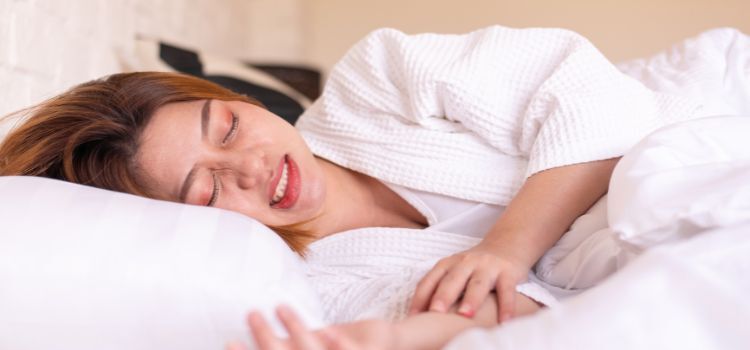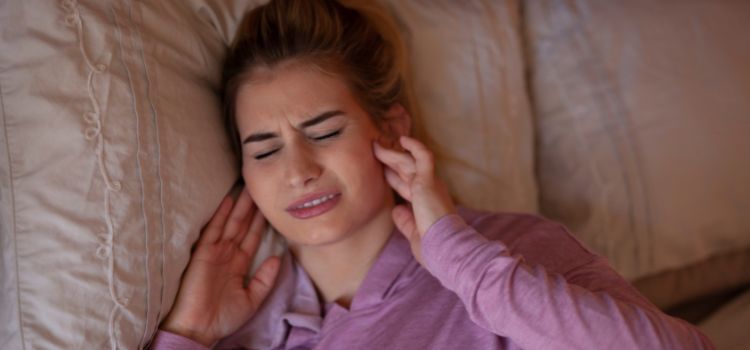Teeth Grinding and Perimenopause
6th Sep 2025

Grinding your teeth during perimenopause? You're not alone. Hormone changes—especially dropping estrogen—can lead to stress, poor sleep, and muscle tension. These can all trigger teeth grinding at night.
It’s common, and it can be managed. In this post, we’ll explain the link between perimenopause and teeth grinding, what to look out for, and how a custom night guard can help protect your teeth while you sleep.
Is Teeth Grinding a Symptom of Perimenopause?

Yes, it can be. Research shows that Perimenopausal women may experience Tooth abrasion, attrition, and erosion (caused by brushing, grinding, or acidic foods)
During perimenopause, hormone levels—especially estrogen—start to drop. This shift can affect how your body handles stress, sleep, and muscle tension. All of these are common triggers for teeth grinding.
Lower estrogen can also lead to anxiety, mood changes, and poor sleep. When you're not sleeping well or feeling stressed, your jaw muscles may tense up during the night, causing you to grind your teeth without even realizing it.
Important: So while teeth grinding isn’t a direct symptom of perimenopause, the changes happening in your body during this time can make it more likely to occur.
Why You Might Be Grinding Your Teeth During Perimenopause
Teeth grinding during perimenopause is often linked to the changes your body goes through as hormone levels shift. Here’s how it happens:
Estrogen Drops and Sleep Disruption
As estrogen levels decline, sleep quality often gets worse. You might wake up more during the night or have trouble falling asleep. Poor sleep can lead to more jaw tension and grinding.
Increased Stress and Anxiety
Studies show hormonal changes can make you feel more anxious or stressed, even if nothing major has changed in your life. This added tension often shows up at night through teeth grinding.
TMJ Sensitivity
The temporomandibular joint (TMJ) connects your jaw to your skull. During perimenopause, this area can become more sensitive due to muscle tension and inflammation, making grinding more painful and frequent.
Cortisol and Nighttime Bruxism
When you're under stress, your body produces more cortisol (the stress hormone). High cortisol levels and poor-quality sleep can trigger or worsen nighttime teeth grinding.
Related Articles:
- Teeth Feel Weird? 5 Common Issues
- What is Daytime Bruxism Or Teeth Grinding?
- What Causes TMJ To Flare Up?
Common Symptoms of Teeth Grinding

Teeth grinding often happens during sleep, so you might not notice it right away. Here are some signs to watch for:
- Jaw pain or tightness
- Headaches, especially in the morning
- Worn, chipped, or cracked teeth
- Clicking or popping in the jaw
- Tooth sensitivity
- Interrupted sleep or feeling tired in the morning
Note: If you're experiencing any of these, especially during perimenopause, it’s a good idea to take action early to protect your teeth.
4 Ways To Manage Teeth Grinding Caused by Perimenopause
You can’t stop hormone changes, but you can reduce the impact of teeth grinding. Here are a few ways to manage it:
1. Wear a Night Guard
Wearing a night guard can help protect your teeth from grinding while you sleep. It acts as a cushion between your upper and lower teeth to prevent damage. A custom-fit night guard is more comfortable and works better than store-bought ones because it’s made to fit your mouth exactly.
2. Improve Your Sleep Routine
Getting better sleep can help stop teeth grinding. Try to sleep at the same time every night. Avoid caffeine and screen time before bed so you can fall asleep more easily. Keep your bedroom cool and quiet to help you stay asleep. Good sleep helps your body relax and can reduce grinding.
3. Manage Stress
Hormone changes during perimenopause can make you feel more stressed. To help manage it, try light exercise, deep breathing, or talking to someone. Writing in a journal can also help clear your mind. Lowering stress can relax your jaw and help you sleep better, which may reduce teeth grinding.
4. Talk to Your Doctor
If your symptoms are getting worse or not going away, talk to your doctor. They might suggest hormone therapy, sleep aids, or muscle relaxants to help you feel better. A doctor can guide you to the right treatment for your needs.

- Most Popular
- Hard Outside, Soft Inside
- 2MM Thick
- Moderate / Heavy

- Most Durable
- Hard Materials
- 1.5MM Thick
- Heavy / Severe

- For Day Time Use
- Thin, Barely Visible
- 1MM Thick
- Light / Moderate

- For Clenching
- Flexible & Soft
- 1.5MM Thick
- Light / Moderate
Related Articles:
- How to Stop Teeth Clenching?
- Bruxism Diet To Manage Symptoms Of Bruxism
- How To Relieve Tooth Pain From Grinding?
FAQs About Teeth Grinding and Perimenopause
How do I know if I’m grinding my teeth at night?
You might notice symptoms like jaw pain, morning headaches, worn teeth, or disturbed sleep. A dentist can confirm if you have signs of grinding (bruxism).
Can low estrogen cause jaw tension or pain?
Yes. Low estrogen can lead to muscle tension and increased sensitivity in the jaw. This may cause jaw pain, tightness, or make you more likely to grind your teeth.
Will a night guard stop the grinding?
A night guard won’t stop the grinding, but it protects your teeth from damage. It also helps reduce jaw pain by easing pressure on the muscles and joints.
Conclusion:
Teeth grinding during perimenopause is common—and manageable. Hormone changes can affect your sleep, stress levels, and jaw muscles, all of which can lead to grinding.
The key is to act early. A night guard can protect your teeth, while better sleep and stress management can ease the root causes. If symptoms continue, don’t hesitate to reach out to a professional.
Pro Teeth Guard offers custom night guards that are affordable, comfortable, and delivered straight to your door—no dental visits needed.
References:
- Mattana, D., Zarkowski, P., Wyche, C., Zagar, S., & Luxmore, J. (1996). Perimenopausal women: Oral health status and preventive strategies. Journal of Women & Aging, 8(1), 21–32. https://doi.org/10.1300/J074v08n01_04
- Tandon, V. R. (2022). Menopause and sleep disorders. Journal of Mid-Life Health, 13(1), 26–33. https://doi.org/10.4103/jmh.jmh_18_22
- Newson, L., & Okoye, U. (2021, November 24). Oral health and the menopause [Factsheet]. Balance (Newson Health Limited). Retrieved [insert retrieval date], from https://balance-menopause.com/uploads/2021/11/Oral-health-and-menopause.pdf
- Robinson, J. L., Johnson, P. M., Kister, K., Yin, M. T., Chen, J., & Wadhwa, S. (2019). Estrogen signaling impacts temporomandibular joint and periodontal disease pathology. Odontology, 108(7), 153–165. https://doi.org/10.1007/s10266-019-00439-1 ResearchGate+15ResearchGate+15SpringerLink+15
- Verghese, R. S. (2020). Comparative evaluation of salivary cortisol levels in premenopausal and postmenopausal women and its correlation with postmenopausal oral signs and symptoms (Doctoral dissertation). Rajiv Gandhi University of Health Sciences (India). ProQuest Dissertations Publishing, 30581233.
- Craft, R. M. (2007). Modulation of pain by estrogens. Pain, 132(Suppl 1), S3–S12. https://doi.org/10.1016/j.pain.2007.09.028

- Most Popular
- Hard Outside, Soft Inside
- 2MM Thick
- Moderate / Heavy

- Most Durable
- Hard Materials
- 1.5MM Thick
- Heavy / Severe

- For Day Time Use
- Thin, Barely Visible
- 1MM Thick
- Light / Moderate

- For Clenching
- Flexible & Soft
- 1.5MM Thick
- Light / Moderate
